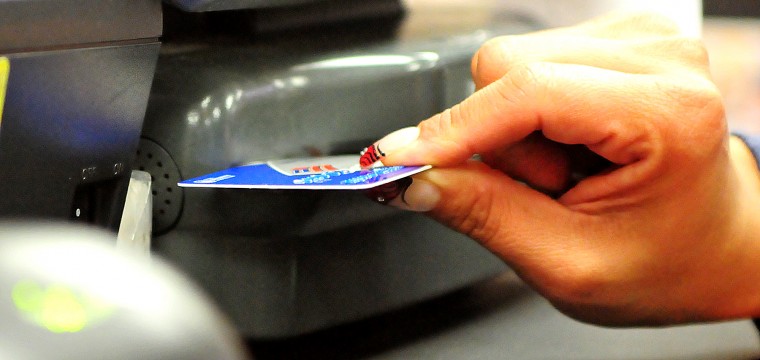
Jaclyn Borowski
For senior anthropology major Kelly MacBride-Gill, charging purchases to a credit card in her parent’s name felt like freedom.
“My mother gave us a joint account with her credit and so hey, why use debit when you have a free line of credit?” she said, laughing.
But MacBride-Gill is part of a growing number of consumers who are putting a halt to their charge-happy spending habits in an effort to manage their money more wisely, according to U.S. Federal Reserve reports.
“Any money that I spend on the credit card, within that month, I’m going to see it coming back at me, and [my parents] asking me to pay,” she said. “I prefer to use cash just because it’s easier than having to pay them back at the end of the month — I can keep better track of how much I’m spending.”
As recession-stung consumers ditch credit for debit, students are following suit. Reports from the Federal Reserve show that use of revolving credit — mainly in the form of credit cards — dropped by $6.1 billion in July, while debit card usage surged. This new trend reverses nearly three decades of dependence on credit.
Freshman special education major Katie Fox said her parents won’t let her have a credit card — a restriction she doesn’t object to so that she can keep a close watch on her spending habits.
“I have an online account so I can watch my money and manage my money, so that’s good for me,” she said. “I would go out of control with [a credit card].”
Others, like junior elementary education major Michelle Gregos, have continued to apply for credit cards. But Gregos said she will continue to use debit to pay for her purchases for fear of forgetting to pay a high-interest bill at the end of the month.
“I just think it’s really easy — that way I have my own bank account for that, and I keep track of all the money that’s on there,” she said. “That way, I don’t have to worry about paying a bill at the end of the month or anything like that.”
Statistically, the majority of students have credit cards in their wallets: According to a 2005 study by student loan company Nellie Mae, 76 percent of students began the 2004 school year with credit cards. However, that number had decreased since 2001, and the report showed that students were also charging less than ever.
Those still with parent-backed credit cards appreciate the benefits. Some, like freshman letters and sciences major Nahal Mottaghian, are told exactly what they can — and can’t — charge to the card.
Mottaghian’s parents pay for the purchases she charges to the credit card under her name, although they also dictate what she’s allowed to buy when she uses it.
“I was supposed to use it for gas and food only, which I do for the most part,” she said. “I don’t really use it for anything other than what they tell me to.”
Even though she’s careful not to swipe her credit card too often, Mottaghian said buying things on credit feels deceptively safe.
“I don’t really realize that I’m spending money, so I don’t feel like I’m spending anything, so it doesn’t affect me that much — selfish as that sounds,” she said.
Economics professor John Ham said that credit cards typically spawn a feeling of false security, allowing consumers to pretend they’re not spending money even as they accrue larger and larger debts.
But once consumers are faced with a daunting credit card bill, they realize the destructive nature of their spending habits, which is likely to make some “more conservative … because they don’t want to go bankrupt,” he said.
aisaacs@umdbk.com



